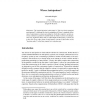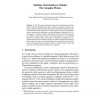12 search results - page 1 / 3 » Whose Anticipations |
ALS
2003
Springer
13 years 10 months ago
2003
Springer
The central question in this paper is: Who (or what) constructs anticipations? I challenge the (tacit) assumption of Rosen’s standard definition of anticipatory systems according...
PRICAI
2000
Springer
13 years 8 months ago
2000
Springer
This paper introduces the even-odd POMDP, an approximation to POMDPs in which the world is assumed to be fully observable every other time step. The even-odd POMDP can be converte...
NN
2007
Springer
13 years 4 months ago
2007
Springer
Several scientists suggested that certain perceptual qualities are based on sensorimotor anticipation: for example, the softness of a sponge is perceived by anticipating the sensa...
ISCA
2000
IEEE
13 years 9 months ago
2000
IEEE
For many applications, branch mispredictions and cache misses limit a processor’s performance to a level well below its peak instruction throughput. A small fraction of static i...
IJSI
2008
13 years 4 months ago
2008
In [19], Toyama proved that the union of two confluent term-rewriting systems that share absolutely no function symbols or constants is likewise confluent, a property called modula...


